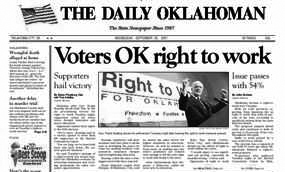Oklahoma's Right to Work Anniversary -- A Success Story!
In 2001, Sooners defied Big Labor by approving a statewide ban on forced union dues. Since its Right to Work law took effect, Oklahoma has become a national leader in private-sector compensation and job growth.
Oklahoma Celebrates Right to Work Anniversary -- Sooner Experience Reinforces Case For Federal Forced-Dues Repeal
(Source: October 2011 NRTWC Newsletter)
On September 25 a decade ago, one of Big Labor's most formidable fear-and-loathing campaigns ever failed when Oklahoma approved a statewide ban on compulsory union dues and fees and thus became the nation's 22nd Right to Work state.
Almost immediately, the very union bosses who had been shrilly predicting that a Sooner Right to Work law would swiftly lead to disaster moved to prevent the law from having any impact at all.
When the Right to Work law had been in effect just seven weeks, Big Labor lawyers launched an underhanded bid to overturn it. This legal attack kept the law's future under a cloud for an extended period.
The state's attorneys and Right to Work attorneys intervening on behalf of several independent-minded workers prevailed in 2003 when the Oklahoma Supreme Court unanimously rejected AFL-CIO union kingpins' demand that it overturn the law.
Oklahoma's Private-Sector Compensation Growth Has Far Outpaced U.S. Average
"Since Big Labor's legal assault on Oklahomans' Right to Work was thwarted, the state has had one of the strongest economies in the country, as measured by a number of key indicators," said Greg Mourad, vice president of the National Right to Work Committee.
"For example, from 2003 to 2010, inflation-adjusted U.S. Commerce Department data show private-sector employer outlays for employee compensation, including wages, salaries, benefits and bonuses, grew by 12.2% in Oklahoma, after adjusting for inflation.
"Sooners' real private-sector compensation expanded at a rate more than three-and-a-half times as great as the national average of 3.4%, and faster than in 41 other states."
Oklahoma Also a Standout For Job Creation







